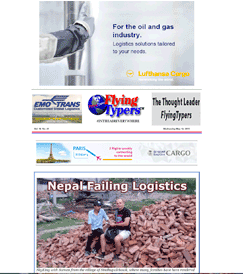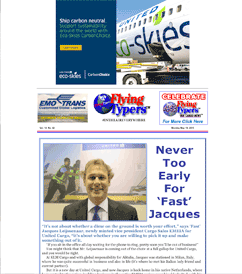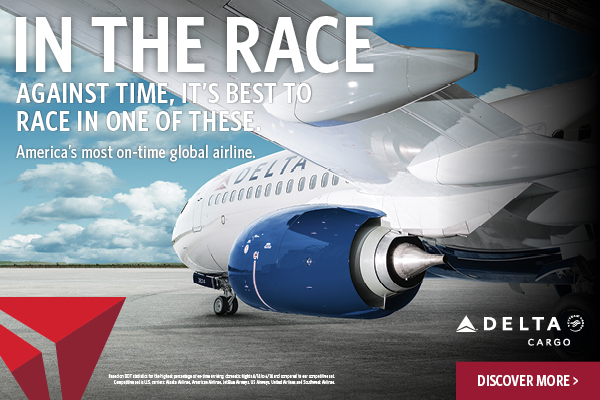 |
 |
 #INTHEAIREVERYWHERE |
| Vol. 14 No. 44 | Wednesday
May 27, 2015 |
 
|
There are some interesting meetings this week in Leipzig, Germany, as The International Transport Forum (ITF), an intergovernmental organization with 54 member countries, which acts as a think tank for transport policy, holds its Annual Summit of transport ministers.
ITF is the only global body
that covers all transport modes, but what caught our eye were the interesting
speakers, including Sarah Hunter, head of Public Policy at Google. Hunter
has worked closely with several product teams as they develop new technologies,
from self-driving cars to life sciences to Unmanned Aerial Vehicles
(UAVs) and the balloon-powered Internet (Project Loon).
|
|
The “flights freeze” taken
by Dutch lawmakers, which stops any further new services into Netherlands
by Gulf carriers, is added to moves already taken by Germany and France
to freeze the allocation of new routes to Emirates, Etihad, and Qatar.
|
 Saudia Cargo inducted its first B777 freighter to the fleet this month and promptly sent the aircraft into operation: SV 3969 departed Mumbai for Jeddah on May 7, bound for points in the Middle East, Africa, and Europe. “Once again Saudia Cargo demonstrates its capability to offer the latest technology with this new addition to the freighter fleet. “By serving Mumbai as its inaugural route, [Saudia Cargo] demonstrates the importance of this market to our global freighter network,” said Regional Director Cargo for the Indian Sub-Continent Keku Gazder, adding: “The new 777F is scheduled to operate twice weekly on the route from Mumbai to Jeddah and beyond. |
 |
In an air cargo industry
looking for new markets, return on investment, and less time on the
ground, the World Trade Organization (WTO) initiative toward acceptance
of a new Trade Facilitation Agreement (TFA) is underway amidst hopes
of ratification by the WTO’s 10th Ministerial Conference in Nairobi
this December 15-18, 2015.
|
On April 25 a 7.8 magnitude
earthquake devastated Nepal, but since then the Himalayan country has
suffered more than 90 aftershocks of over 4.0 magnitude, as well as
a 7.3 quake on May 12, which was followed by a 6.3 quake an hour later.
“Overall we’re really pleased
with the DHL operation. We’re all volunteers and we want to do
our best alongside our local colleagues who have been really enthusiastic
and worked very hard even though many have damaged houses.” |
|
 |
If
You Missed Any Of The Previous 3 Issues Of FlyingTypers |
| Forward this email to a friend |
| Update Profile To continue receiving FlyingTypers |
Publisher-Geoffrey Arend
• Managing Editor-Flossie Arend • Associate Publisher/European Bureau
Chief-Ted Braun Film Editor-Ralph Arend • Special Assignments-Sabiha Arend, Emily Arend • Advertising Sales-Judy Miller |
|



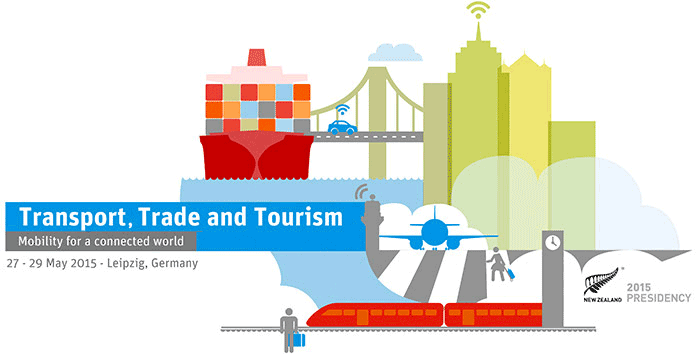
 “Freight
traffic on European roads is forecast to grow by 75 percent until 2025,"
said Hans-Juergen Weidemann, CEO of CargoBeamer.
“Freight
traffic on European roads is forecast to grow by 75 percent until 2025,"
said Hans-Juergen Weidemann, CEO of CargoBeamer. 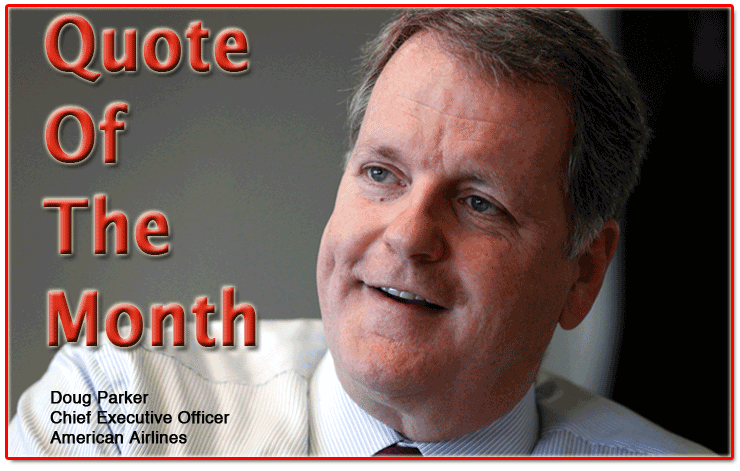 With
the final induction of USAiways, American Airlines becomes the world’s
largest airline. CEO Doug Parker spoke about the Emirates service from
New York to Milan:
With
the final induction of USAiways, American Airlines becomes the world’s
largest airline. CEO Doug Parker spoke about the Emirates service from
New York to Milan:


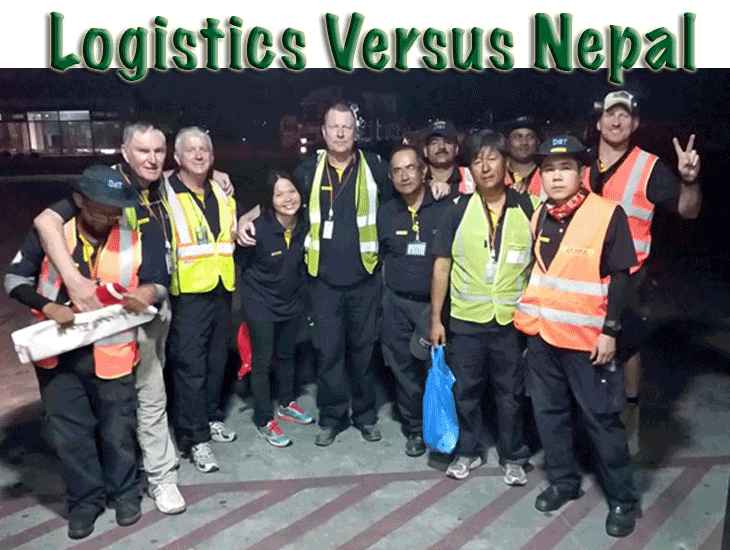 Kim
Melville (third from left) with the DHL Disaster Response Team in Nepal.
Kim
Melville (third from left) with the DHL Disaster Response Team in Nepal.
 The
stewardship of Air Cargo News FlyingTypers hasn't
changed since 1975, and while that is an impressive feat,
what is even more remarkable is that in 2015 we have been
fortunate to present the writings of the nearly 102-year-old
Richard Malkin, who remains the first air cargo reporter
in history (circa 1942) and now serves as FlyingTypers'
Senior Editor.
The
stewardship of Air Cargo News FlyingTypers hasn't
changed since 1975, and while that is an impressive feat,
what is even more remarkable is that in 2015 we have been
fortunate to present the writings of the nearly 102-year-old
Richard Malkin, who remains the first air cargo reporter
in history (circa 1942) and now serves as FlyingTypers'
Senior Editor.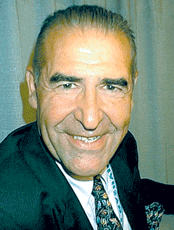 As
Jean-Alain Ress takes a hard look at the air cargo industry, there
is little question that competition is steadily gaining muscle.
Ress, who heads marketing for Aeroports de Paris cargo and ground
handling services, predicted that the traditional notion of Europe
as individual countries, each representative of an exclusive distribution
hub, is surely on the way out—what lies immediately ahead
is a single European market. The situation has greatly changed
for such major European airports as Paris, London, and Germany,
and with the creation of a single market, Europe will look drastically
different—in fact, it will be the world’s biggest
market.
As
Jean-Alain Ress takes a hard look at the air cargo industry, there
is little question that competition is steadily gaining muscle.
Ress, who heads marketing for Aeroports de Paris cargo and ground
handling services, predicted that the traditional notion of Europe
as individual countries, each representative of an exclusive distribution
hub, is surely on the way out—what lies immediately ahead
is a single European market. The situation has greatly changed
for such major European airports as Paris, London, and Germany,
and with the creation of a single market, Europe will look drastically
different—in fact, it will be the world’s biggest
market.  The
formation of a new automated export system (AES), with a development
team comprising multidisciplinary Customs and Census employees,
and including operational and technical staff members at the U.S.
Customs Service came under Sharon Mazur. AES was in strong support
of the administration’s effort to improve the collection
of trade-related statistics as well as the objectives of the National
Performance Review—for example, the expansion of electronic
government, streamlining trading process, and the elimination
of publication and unnecessary data. AES was zeroing in on upgraded
trade statistics, improved collection of the management fee, facilitation
of exports, and improved export compliance.
The
formation of a new automated export system (AES), with a development
team comprising multidisciplinary Customs and Census employees,
and including operational and technical staff members at the U.S.
Customs Service came under Sharon Mazur. AES was in strong support
of the administration’s effort to improve the collection
of trade-related statistics as well as the objectives of the National
Performance Review—for example, the expansion of electronic
government, streamlining trading process, and the elimination
of publication and unnecessary data. AES was zeroing in on upgraded
trade statistics, improved collection of the management fee, facilitation
of exports, and improved export compliance. 